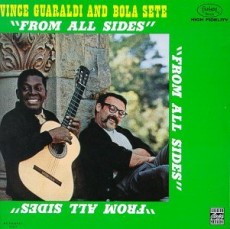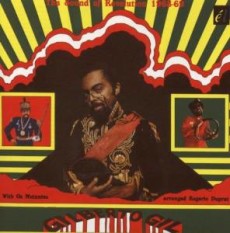
Daily Dose Of Jazz…
Léonardo Gandelman was born Leonardo Gandelman on August 10, 1956, in Rio de Janiero, Brazil. He spent his childhood studying classical music and by age sixteen he was a soloist with the Brazil Symphony Orchestra. He furthered his studies on saxophone, composition and arrangements at Berklee College of Music.
Returning home in 1979 he began his professional career combining Brazilian rhythms and jazz. Eight years later he launched his solo career and to date has participated in over 800 recordings.
Leo has played with Luis Santos, guest appeared in Titas’ single Telecisao and is famous for composing Brazilian telenovelas, films and series soundtracks. He has performed at Lincoln Center and festivals such as Hollywood Rock and the Montreux Festival. The Jornal do Brasil has voted him the most popular instrumental artists 15 consecutive years.
Composer, arranger and saxophonist Leo Gandelman has performed with Caetano Veloso, Chico Buarque, Milton Nascimento, Luiz Melodia, Leny Adrade, Ney Matogrosso, Joel Nascimento and Leila Pinheiro as well as with the Bahia Symphony Orchestra, the Ribeirai Preto Symphony Orchestra and the Young Orchestra of Caracas. He continues to perform, record and tour.

Daily Dose Of Jazz…
Don Ellis was born on July 25, 1934 in Los Angeles, California and started playing th trumpet in his youth. After a move to Minneapolis, Minnesota attended West High School. Upon hearing the Tommy Dorsey Big Band he became interested in jazz as well as being inspired by Louis Armstrong and Dizzy Gillespie. He went on to receive a music composition degree from Boston University.
Ellis’ first job was with the Glenn Miller Band until his enlistment in the U.S. Army Symphony Orchestra and the Soldier’s Show Company. Transferred to Germany he met Cedar Walton, Eddie Harris and Don Menza and got his first opportunity to compose and arrange for a big band. Two years later he was in New York City playing in dance hall bands, toured with Charlie Barnet and by ’59 was in Maynard Ferguson’s band.
Becoming involved in the avant-garde jazz scene he appeared on albums by Charles Mingus, Eric Dolphy and George Russell, staying with the latter for two years. Ellis led several sessions with small groups between 1960 and 1962 that featured Jaki Byard, Paul Bley, Gary Peacock, Ron Carter, Charlie Persip and Steve Swallow among others. He would go on to tour Poland, Germany and Sweden, return to New York, form the Improvisational Workshop Orchestra, studied ethnomusicology, Indian music, be involved with several Third Stream Projects and teach at SUNY Buffalo for a year. He delved into electronic music in the late Sixties on Columbia Records with Electric Bath and garnered a Grammy nomination and a Down Beat Album of the Year Award.
Don’s popularity among educators was also climbing and copies of his band’s charts were being published and played by many high school and college big bands. Accordingly, he taught many clinics and played with many school bands. He composed the music for the film The French Connection, winning Grammy for Best Instrumental Arrangement and later composed music for the film The Seven-Ups.
He became interested in Brazilian music and created the Organic Band utilizing a vocal quartet and indigenous musicians. He would continue performing and touring well into the Seventies and his last known public performance took place on April 21, 1978, at the Westside Room in Century City. After this date, his doctor ordered him to refrain from touring and playing trumpet because it was too stressful on his heart. On December 17, 1978, after seeing a Jon Hendricks concert, trumpeter, composer, arranger, bandleader and educator Don Ellis suffered a fatal heart attack at his North Hollywood home where his parents were staying with him. He was 44.
More Posts: trumpet

Daily Dose Of jazz…
Bola Sete was born Djalma de Andrade on July 16, 1923 in Rio de Janiero, Brazil. His name translates to Seven Ball and in Brazilian billiards the seven ball is the black ball on the table. He got this nickname when he was the only black member of a small jazz group. He studied guitar at the Conservatory of Rio and started performing with his own sextet and local samba groups while he was still a student. His early influences were guitarists Django Reinhardt, Charlie Christian, Barney Kessell and Oscar Moore, as well as the big band sounds of Dizzy Gillespie, Tommy Dorsey and Woody Herman that toured South America.
His career began in 1952 playing various clubs and hotels around Italy for four years. Then returning to Brazil while touring South America he was spotted by the manager of the Sheraton hotels who brought him to the States to play in New York’s Park Sheraton and San Francisco’s Sheraton Palace. Dizzy Gillespie was staying there at the time and listening to Bola Sete playing every day. When Gillespie decided to bring his pianist Lalo Schifrin to the hotel, he discovered that Lalo and Bola had already met and played together in Argentina. This meeting was the beginning of Bola’s success in the US. In the fall of 1962, Gillespie took the guitarist to the 9th Annual Monterey Jazz Festival. Enjoying huge success he toured for a while with Gillespie then returned to San Francisco and joined the Vince Guaraldi Trio.
Bola was already well known in the US, and his partnership with Guaraldi yielded several well-received recordings. After staying for a couple of years Bola formed his own trio with his fellow Brazilians, bassist Sebastian Neto and drummer Paulinho da Costa. In the 1970s, he became friends with guitarist John Fahey, who had been an admirer of Sete’s. In 1975, Fahey used his Takoma label to release Ocean, which is now seen as one of Sete’s greatest accomplishments.
During the eighties, Sete suffered from lung cancer and though he attempted to counter with yoga and meditation, on February 14, 1987 guitarist Bola Sete passed away at Marin General Hospital in Greenbrae, California from complications caused by pneumonia and cancer.
More Posts: guitar

Daily Dose Of Jazz…
Reedman Dexter Payne was born on July 5, 1951 in Denver, Colorado. The clarinet was his first instrument and went on to master the alto and baritone saxophones adding them to his arsenal. His early influences were Artie Shaw, Buddy DeFranco, Benny Goodman, Stan Getz, Zoot Sims, Gerry Mulligan,Benny Carter, Johnny Hodges and Lester Young.
A very lyrical and melodic player, Dexter plays swing, bop, cool jazz, and Brazilian jazz as well as other forms of music including Latin. In 2000 he played with Brazilian musician Thiago de Mello, recorded the album Inspiration in 2003, with Brazilian guitarist Antonio Mello,
He followed with his sophomore release in 2005 release Another Feeling with producer Arnaldo De Souteiro on his Jazz Station label. He recorded again in 3006 and 2007 which de Mello produced and released Our Time to Remember. Clarinetist and saxophonist Dexter Payne continues to perform, record and tour.

Daily Dose Of Jazz…
Gilberto Passos Gil Moreira was born June 26, 1942 in Salvador do Bahia, Brazil though he spent much of his childhood in the countryside of Ituaca. The offspring of a doctor and a schoolteacher, he attended the Marist Brothers school until he was nine and then returned to Salvador for secondary school.
Gil’s interest in music began when he was two and grew up listening to the forro music and the street performers of Salvador. Early on, he began to play the drums and the trumpet, and then took up the accordion before attending music school. He first played classical music, but grew more interested in the folk and popular music of Brazil, influenced by accordionist Luiz Gonzaga. He discovered the samba music of Dorival Caymmi, American big band jazz and tango.
In 1950 while still in high school he joined his first band, Os Desafinados (The Out of Tunes), playing accordion and vibraphone and singing. Soon afterwards he settled on the guitar as his instrument after hearing Joao Gilberto and started playing bossa nova. Gil met guitarist and singer Caetano Veloso at the Universidade Federal da Bahia in 1963 and immediately they began collaborating and performing together, releasing a single and EP soon afterwards. Along with Maria Bethania, Gal Costa and Tom Ze, they opened the Vila Velha Theatre with a night of bossa nova and traditional Brazilian songs in 1964.
Gilberto would go on to become musical director of the theatre’s concert series, sold bananas, composed jingles for tv ads and work for Unilever before moving to Sao Paulo in in 1965. Though he had a hit single with Louvação that was later recorded by Elis Regina, his first solo hit was the 1969 song Aquele Abraco. Arrested with Veloso he spent seven months in jail and house arrest and then instructed to leave the country. After a concert in Salvador in ’69 they left for Portugal, Paris and London where he listened to Bob Marley, Jimmy Cliff and Burning Spear. He performed with Yes, Pink Floyd and the Incredible String Band. It was in London that he recorded Gilberto Gil Nega and attended Miles Davis and Sun Ra concerts.
Over the course of his career he participated in the Aids benefit album Red, Hot + Rio, win Grammy awards, receive the Legion d’honneur from France, and was the first Latin American recipient of the Polar Music Prize in Stockholm. In between performances he turned to politics becoming the Salvador Secretary of Culture, founded the environmental protection organization Onda Azul (Blue Wave), was a Good will Ambassador for the Food and Agriculture Organization of the United Nations, became Brazil’s Minister of Culture and then retired due to a vocal cord polyp.
Tenor, baritone and falsetto vocalist, guitarist, lyricist and composer Gilberto Gil who is one of the pioneers of tropicália, and became increasing interested in the welfare of Black culture and focused on Afro-Brazilian culture. He continues to transcend the eras of dance and music trends emerging on the other side with a blend of music styles that stay true to his traditional Bahian roots while engaging with commercial markets.


